|
Teaching has an indispensable role in the functions of higher education institutions. The importance of "teaching and learning" is emphatically highlighted in the "Aspirations for the Higher Education System in Hong Kong" published in December 2010.
The UGC is committed to safeguarding and promoting the quality of UGC-funded institutions and their activities. The UGC established the QAC, a semi-autonomous non-statutory body under the aegis of UGC, to provide third-party oversight. One of the QAC's core operational tasks is to conduct quality audits of individual UGC-funded institutions to assure the quality of their educational provision (however funded) at first degree level and above leading to a Hong Kong award, with due regard to institutions' autonomy and self-accrediting status.
Apart from quality assurance, the UGC is also committed to enhancing teaching methods and student learning outcomes, in particular the language proficiency of students. To this end, the UGC provides institutions with the Teaching Development Grants and Language Enhancement Grants, and implements other relevant initiatives. The UGC also promotes outcome-based student learning approaches, which are increasingly used in the global scene.
Quality Audits
The QAC's approach to quality audits stems from the recognition that institutions have distinct and varied missions, reflecting the UGC's vision of a differentiated yet interlocking higher education system. Recognising that each institution has objectives appropriate to its mission, the QAC defines quality in terms of 'Fitness for Purpose', where institutions have different purposes that reflect their missions and the role statements they have agreed with the UGC. The QAC sees itself as forming a partnership with institutions in assuring and enhancing the quality of student learning experience in Hong Kong, for the benefit of all concerned.
A quality audit examines whether an institution has quality assurance processes in place appropriate for its stated purposes, whether it pursues activities and applies resources to achieve those purposes, and whether there is verifiable evidence to show that the purposes are being achieved. The QAC's Audit Manual sets out how the QAC conducts audits and what it expects to receive from institutions.
With the publication of last two audit reports on PolyU and HKIEd in 2011, the QAC's first audit cycle was completed. To prepare for the second round of quality audits, the QAC is conducting a review of the audit methodology and approach in consultation with the eight UGC-funded institutions.
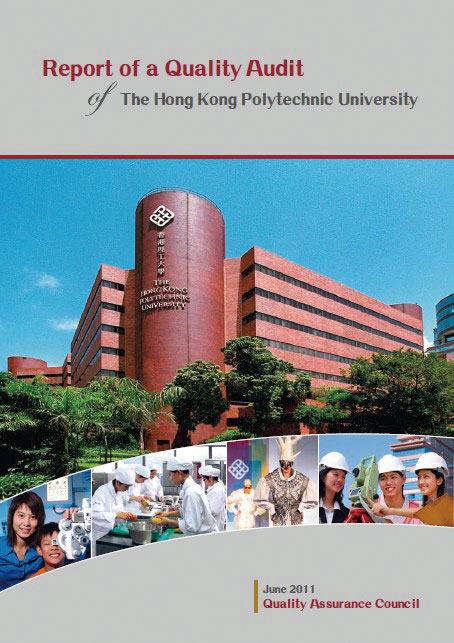
|
|
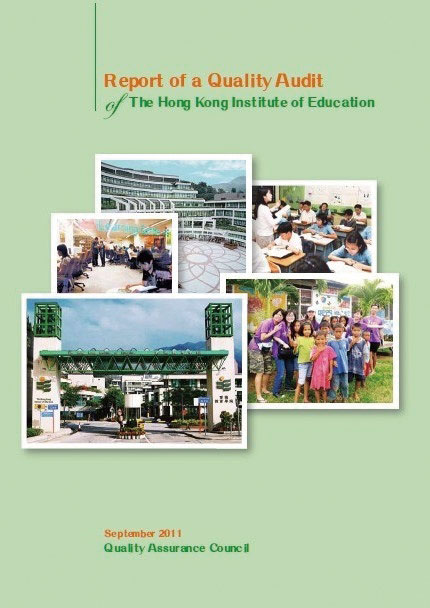
|
|
Audit reports of PolyU and HKIEd were published on 9 June and
30 September 2011 respectively.
|
Teaching and Learning
Teaching Development Grants
"Teaching and learning" is central to the roles of all institutions. To encourage institutions to adopt innovative approaches to teaching, and to improve the quality of the learning environment, the UGC provides institutions with Teaching Development Grants. For 2011/12, the UGC disbursed a total of $37.6 million as Teaching Development Grants. Allocation is mainly based on the student numbers at undergraduate and sub-degree levels.
The UGC engaged a consultant to visit institutions in January and June 2011 to review their teaching development efforts. The consultant commended the institutions for the impressive outcomes achieved through the use of Teaching Development Grants and the quality procedures for the selection and administration of Teaching Development Grants projects.
With the UGC's support, a one-day Mid-Triennium Seminar on teaching development was held on 17 June 2011 at HKBU. Over 60 participants from the eight UGC-funded institutions joined the event to discuss various areas including institutional collaboration on teaching and learning, professional development and the establishment of communities of practices to facilitate the dissemination of good practices. In the light of the discussion of the Mid-Triennium Seminar, the UGC has decided that, in 2012-15, –
- to inject $7 million to the Teaching Development Grants to support worthwhile collaborative projects on teaching and learning;
- to inject $5 million per annum to the Teaching Development Grants to support teaching development activities of all front-line teaching staff members;
- to establish a fund of $16 million to meet the start-up costs of setting up communities of practices.
The UGC also sponsored a one-day retreat held at HKBU on 24 February 2012 for the discussion of the setting up of communities of practices. About 40 participants from the UGC-funded institutions joined the event.
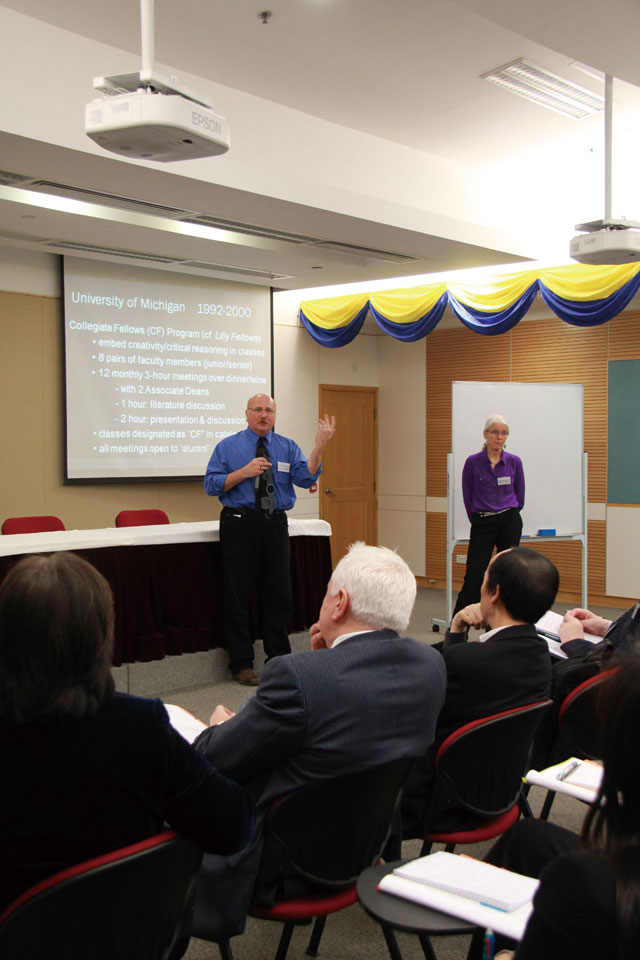
A one-day Mid-Triennium Seminar on
teaching development was held on 17 June
2011.
|
|
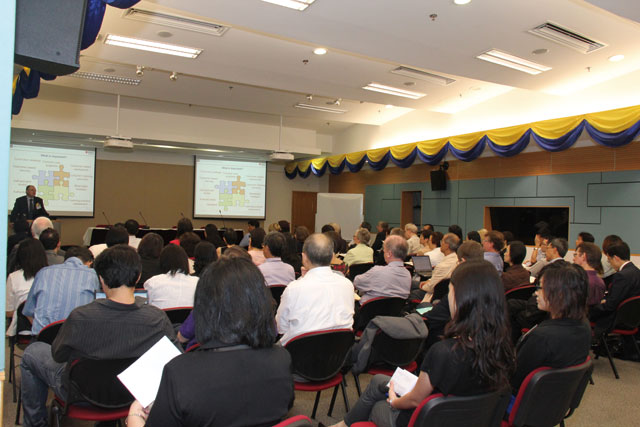
One-day retreat was held at HKBU on 24 February 2012 for the
discussion of the establishment of communities of practice in the
institutions.
|
UGC Teaching Award
The UGC organised the inaugural annual UGC Teaching Award to honour those who excel in teaching in the UGC sector in 2011. In the first round of the award, 16 nominations were received from UGC-funded institutions and were assessed by a selection panel comprising UGC/QAC Members and an external international expert. The two award recipients in 2011 were Professor Richard A Glofcheski of the Department of Law, HKU, and Professor Poon Wai-yin of the Department of Statistics, CUHK. Each recipient was awarded a grant of $500,000 for, inter alia, undertaking learning and teaching initiatives for the benefit of their own institutions and the entire sector. The presentation ceremony of the UGC Teaching Award was held on 8 September 2011.
The UGC invited nominations for the 2012 award in March 2012 and the awardees will be selected and announced in the second half of 2012.
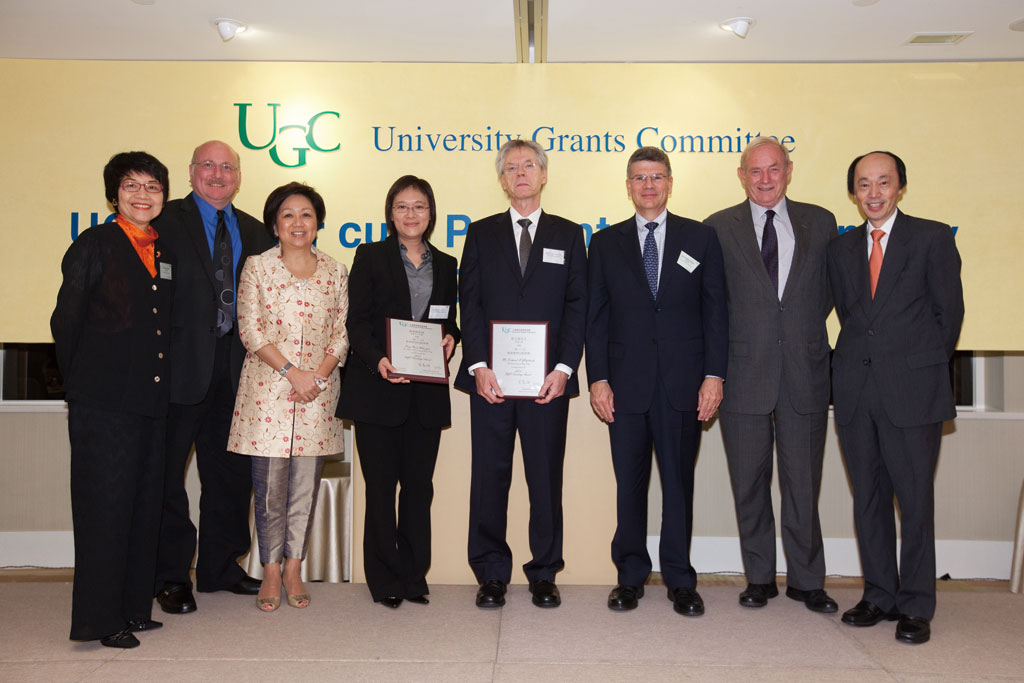
The two recipients of the UGC Teaching Award 2011, Professor Poon Wai-yin (fourth left) and Professor Richard A Glofcheski (fourth right) pictured with the Hon Mrs Laura M. Cha, Former Chairman, UGC (third left) and Members of the Selection Panel, Mrs Pamela Chan (first left), Professor Brian Coppola (second left), Professor William Kirby (third right), Sir Colin Lucas (second right) and the late Professor Edmond Ko (first right) at the presentation ceremony on 8 September 2011.
|
Language Proficiency of Students
Language Enhancement Grants
Enhancing students' language proficiency, which is an essential quality of a globally competitive graduate, is a priority high on the UGC's agenda. To provide additional support to institutions for promoting students' language proficiency in both English and Chinese (including Putonghua), the UGC provides institutions with Language Enhancement Grants, which are on top of resources from their block grants and other sources. A total of $112.4 million was allocated as Language Enhancement Grants in 2011/12. The amount is allocated based on institutions' respective student numbers.
Common English Proficiency Assessment Scheme
Common English Proficiency Assessment Scheme aims to enhance students' awareness of the importance of English language proficiency through participating in an internationally recognised language assessment. The current testing instrument is the International English Language Testing System (IELTS).
Final-year undergraduate students of all UGC-funded institutions may participate in the Scheme on a voluntary basis. They will be reimbursed with the test fee if they agree to have a statement included in their transcripts indicating their participation in Common English Proficiency Assessment Scheme. In 2011/12, about 11 800 final year students, or 64% of the projected number of graduates of the UGC-funded institutions, registered for participation in Common English Proficiency Assessment Scheme.
As the scheme has achieved its original purposes of enhancing students' awareness of the importance of English proficiency and providing a wealth of information on students' strengths and weaknesses in English, the UGC has decided to replace it with a new scheme to provide direct funding support for institutions' collaborative language enhancement projects. The last round of the Common English Proficiency Assessment Scheme will be held in 2013/14.
Collaborative Language Enhancement Projects
The UGC announced in February 2012 the introduction of an arrangement to encourage and support the UGC-funded institutions' collaborative projects on the promotion of language proficiency. Direct funding support of up to $30 million will be provided for UGC-funded institutions' joint projects under the new arrangement in 2012-15. In recognition of the growing importance of Chinese, the arrangement will be extended to cover collaborative projects to enhance proficiency in Chinese. As institutions are stepping up their language enhancement efforts in the new four-year curriculum, the UGC hopes that this new arrangement will give timely support to institutions to make genuine impact on students' language proficiency in a collective and more efficient manner.
|



